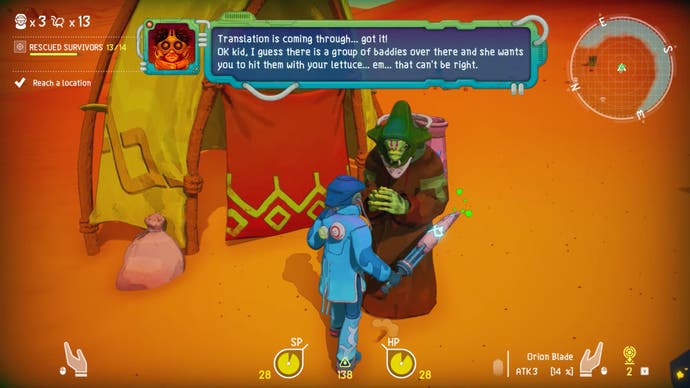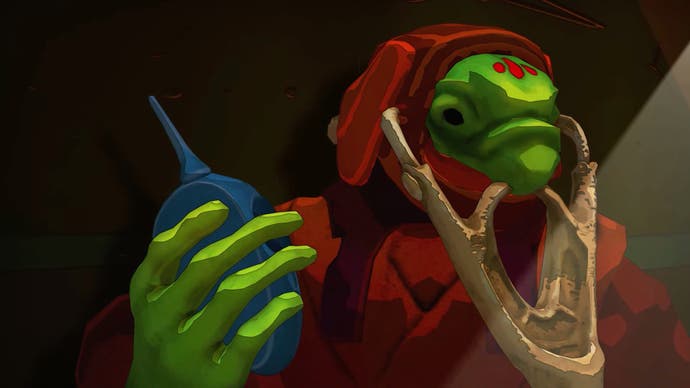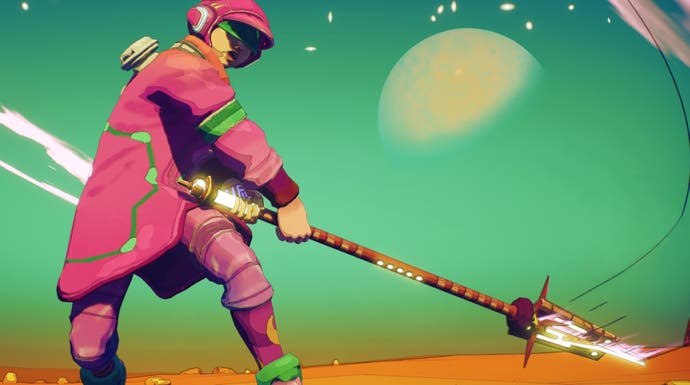PixelJunk Raiders review - a colourful roguelike that falls disappointingly flat
Junk.
At first, you're having a fine old time.
PixelJunk Raiders' combat, if a touch inelegant, is enjoyable enough, your colourful planetary exploration accompanied by the silky strains of otherworldly synth soundscapes. Jewels shimmer in the distance - their ruby glow is hard to miss, particularly at night - and you already hope that the crumbling columns jutting up into the sky over there will have some tasty treasure secreted amongst ruins.
Plus, you're a rescuer, and who doesn't want to be the hero that swoops in and saves a doomed civilisation from certain death? As the saviour here to liberate the trapped Tantallians, you're such a welcome sight to the poor hostages that they'll delight in your arrival by joyously waving their arms in the air.
Locating survivors isn't particularly onerous, either. Most congregate in the citadels sprinkled across the planet Tantal (they're called gloriously nonsensical things like Helplessly Uptight Child and Briskly Happy Advertising; and who wouldn't want to spend a little time in Rapidly Different Answer?), while others can be found by following the smoky trail to their temporary camps in the desert.
So, that's what you do. You bop from one alien landscape to the next, scanning the horizon for smoke signals and sky-high Artifacts, which hint at a nearby citadel. You'll learn that not only can you use your weapons and fists to fight the bad dudes, but you can spend the currency you find - Axontium - on single-use perks courtesy of Mark the Merc. You won't know what they are until you unlock them - yep, that bugs me too, as not all Merc Perks are created equal - but the mines and turrets you unlock should all help thin the herd of enemies. Clear the denizens, save all survivors, and it's time to portal back to the mothership and do it all over again. And again. And again.
Killing giant bugs and rescuing survivors is all you do in PixelJunk Raiders.
You could possibly make your peace with it if the combat was meaty and gratifying. You could even make it work if exploration was rewarded with secrets and collectables. Sadly, though, PixelJunk Raiders is lacking in almost every respect, and despite its arty aesthetic, the more time I spent with PixelJunk Raiders, the less fun I had playing it. I kept waiting for the game to kick up a notch that seemingly doesn't exist.
I have an on/off relationship with roguelikes - that is, games that offer procedurally generated worlds that reset your progress when you die - but admittedly, Pixeljunk Raiders isn't quite as unforgiving as some other examples. You're given three chances to clear each mission and later, you'll unlock a permaperk that even lets you loot your own corpse and reclaim your goodies on each occasion. On the third strike, however, it's summarily over, and any respawns start from scratch.
The issue is, it's all... well, dull, quite frankly. The worlds, though pretty enough, are sparse, empty places that offer very little to do. Despite your neat little jet pack, getting around the bigger maps is a thankless slog. The survivors you're tasked with rescuing are not gifted conversationalists or contribute anything meaningful to the story - and I use that word loosely - and even the cookie-cutter enemies are repetitive to the point of insult. While one-on-one they're not too onerous, as a swarm they're maddeningly - almost cruelly - efficient... especially if your weapon breaks.

Traversing Pixeljunk Raiders without a weapon is teeth-clenchingly frustrating, not least because our nameless avatar has all the CQC talents of a dead goldfish. An enemy you can slice down in two whacks of a sword may require five or six punches from your bare fists, and those blows aren't easy to get in when there's five or six - often more - other foes all swarming to your position and hoping to take you down.
Worse still, it's very possible that some worlds have no weapons in them whatsoever; after all, them's the breaks when you play roguelikes. This means that to complete a level and retain the gear and treasures you've gathered once your weapon has been destroyed, battles dissolve into slow, meandering rounds of strafe-punch-strafe-ouch-strafe-run-aways that don't feel challenging as much as they feel grossly unfair.
To balance this, developer Q-Games employs Stadia's incredibly neat State Share feature. Players can snap a screenshot, share it, and invite other players to hop in and play it, too (well, providing they own the game, of course). The more generous souls may even take it a step further and drop down a load of weapons or Imprints - one-use special abilities that are like the Merc's Perks but can be carried around with you - about the place to help you out.

And that's great, right? Community spirit and cooperation is baked right in. Only trouble is, there's no way of loading up one of these State Shares from within the game - I've only found them via a fantastic spreadsheet shared by the fine folks at Reddit - and beyond a cursory mention early on, the game does nothing to remind you, either. This means that in the opening hours when your inventory is sparse - or whenever there's a precipitous difficulty hike - players are going to struggle to get through each mission intact, possibly because the game needs you to collaborate with others in a way it hasn't clearly communicated to you nor implemented in-game.
There's more; Alien DNA that can be spliced with your own. Unlockable skills and upgrades that let you permanently upgrade your life and stamina meters. It's all window-dressing, though, and adds little extra flavour to Raiders' bland bones. Yes, it's a game that demands you explore before you charge head-first into a fight, and yes, when you find your rhythm - not to mention build up a decent weapon cache - the gameplay loop can be curiously hypnotic. Right now, though, it's simply not enough to redress the repetitive gameplay and brutal learning curve.



.jpg?width=291&height=164&fit=crop&quality=80&format=jpg&auto=webp)






